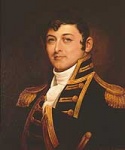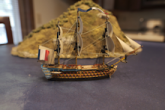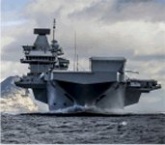On the approach of the Seven Years' War, the island of Minorca, which had been a British possession since 1708, when it was captured during the War of the Spanish Succession, was threatened by a French naval attack from Toulon, and was invaded in 1756. Byng, then serving in the Channel, was ordered to the Mediterranean to relieve the British garrison of Fort St Philip, at Port Mahon. Despite his protests, he was not given enough money or time to prepare the expedition properly. His sailing orders were inexplicably delayed by five days, and this turned out to be crucial to the lack of success of the expedition. He set out with ten unseaworthy ships that leaked and were inadequately manned. Byng's marines were landed to make room for the soldiers who were to reinforce the garrison, and he feared that if he met a French squadron, he would be dangerously undermanned. His correspondence shows that he left prepared for failure, that he did not believe that the garrison could hold out against the French force, and that he was already resolved to come back from Minorca if he found that the task presented any great difficulty. He wrote home to that effect to the Admiralty from Gibraltar, whose governor refused to provide soldiers to increase the relief force.
Byng sailed on 8 May 1756. Before he arrived, the French landed 15,000 troops on the western shore of Minorca, spreading out to occupy the island. On 19 May, Byng was off the east coast of Minorca and endeavoured to open communications with the fort. Before he could land any soldiers, the French squadron appeared. The Battle of Minorca was fought on the following day. Byng, who had gained the weather gage, bore down on the French fleet at an angle, so that his leading ships went into action while the rest, including Byng's flagship, were still out of effective firing range. The French badly damaged the leading ships and slipped away. When his flag captain pointed out to Byng that by standing out of his line, he could bring the centre of the enemy to closer action, he declined because Thomas Mathews had been dismissed for so doing. The French, who were equal in number to the British, sailed away undamaged.
After remaining near Minorca for four days without being able to reestablish communication with the fort or sighting the French, Byng realised that there was little more he could do without effecting badly needed repairs to his ships. As the nearest port available for carrying out repairs and landing his wounded men was Gibraltar, Byng's plan was to sail there, repair his ships, and try once again to get extra forces before returning to Fort St Philip. He accomplished this, and after the reinforcements arrived Byng began preparation for a return to Minorca to relieve the garrison. However, before his fleet could sail, another ship arrived from England with further instructions, relieving Byng of his command and took him back to England, where he was placed into custody. Ironically, Byng was finally promoted to full Admiral on 1 June, following the action off Minorca. The garrison on Minorca held out against the overwhelming French numbers until 29 June, when it was forced to capitulate. Under negotiated terms the garrison was allowed passage back to England, and the fort and island came under French control.
The failure to hold Fort St Philip initially caused public outrage among fellow officers and the country at large. Byng was brought home to be tried by court-martial for breach of the Articles of War, which had recently been revised to mandate capital punishment for officers who did not do their utmost against the enemy, either in battle or pursuit. The revision to the Articles followed an event in 1745 during the War of Austrian Succession, when a young lieutenant named Baker Phillips was court-martialed and shot after his ship was captured by the French. His captain, who had done nothing to prepare the vessel for action, was killed almost immediately by a broadside. Taking command, the inexperienced junior officer was forced to surrender the ship when she could no longer be defended. Although the negligent behaviour of Phillips's captain was noted by the subsequent court martial and a recommendation for mercy entered, his sentence was approved by the Lords Justices of Appeal. This injustice angered the nation and the Articles of War were amended to become one law for all: the death penalty for any officer who did not do his utmost against the enemy in battle or pursuit.
The court martial sitting in judgement on Byng acquitted him of personal cowardice and disaffection, and convicted him only for not having done his utmost, since he chose not to pursue the superior French fleet, instead deciding to protect his own. Once the court determined that Byng had "failed to do his utmost", it had no discretion over punishment under the Articles of War, and therefore condemned Byng to death. However, its members recommended that the Lords of the Admiralty ask King George II to exercise his royal prerogative of mercy.
The new First Lord of the Admiralty, Lord Temple, was granted an audience with the king to request clemency, but this was refused in an angry exchange. Four members of the board of the court martial petitioned Parliament, seeking to be relieved from their oath of secrecy to speak on Byng's behalf. The Commons passed a measure allowing this, but the Lords rejected the proposal. The Prime Minister, William Pitt the Elder, was aware that the Admiralty was at least partly to blame for the loss at Minorca due to the poor manning and repair of the fleet. Lord Newcastle, the politician responsible, had by now joined the Prime Minister in an uneasy political coalition and this made it difficult for Pitt to contest the court martial verdict as strongly as he would have liked. He did, however, petition the king to commute the death sentence. The appeal was refused: Pitt and King George II were political opponents, with Pitt having pressed for George to relinquish his hereditary position of Elector of Hanover as being a conflict of interest with the government's policies in Europe.
The severity of the penalty, combined with suspicion that the Admiralty sought to protect themselves from public anger over the defeat by throwing all the blame on the admiral, led to a reaction in favour of Byng in both the Navy and the country, which had previously demanded retribution. Pitt, then Leader of the House of Commons, told the king: "the House of Commons, Sir, is inclined to mercy", to which George responded: "You have taught me to look for the sense of my people elsewhere than in the House of Commons."
The king did not exercise his prerogative to grant clemency. Following the court martial and pronouncement of sentence, Admiral Byng had been detained aboard HMS Monarch in the Solent, and on 14 March 1757, he was taken to the quarterdeck for execution. In the presence of all hands and men from other ships of the fleet in boats surrounding Monarch, the admiral knelt on a cushion and signified his readiness by dropping his handkerchief, whereupon a platoon of Royal Marines shot John Byng dead.
Byng's execution was satirized by Voltaire in his novel Candide. In Portsmouth, Candide witnesses the execution of an officer by firing squad; and is told that "in this country, it is good to kill an admiral from time to time, in order to encourage the others" (Dans ce pays-ci, il est bon de tuer de temps en temps un amiral pour encourager les autres). Byng was the last of his rank to be executed in this fashion, and 22 years after the event the Articles of War were amended to allow "such other punishment as the nature and degree of the offence shall be found to deserve" as an alternative to capital punishment. In 2007, some of Byng's descendants petitioned the government for a posthumous pardon; the Ministry of Defence refused. Members of his family and a group at Southill in Bedfordshire where the Byng family lived continue to seek a pardon.
Byng's execution has been called "the worst legalistic crime in the nation's annals". Nevertheless, it may have influenced the behaviour of later naval officers by helping inculcate "a culture of aggressive determination which set British officers apart from their foreign contemporaries, and which in time gave them a steadily mounting psychological ascendancy". This in turn may have contributed to the success of the Royal Navy and the acquisition and defence of the British Empire, as commanders knew that while there was a chance of failure in battle, not to risk battle was certain to result in punishment. In the words of one historian of the Royal Navy, this "judicial murder" had brutally demonstrated that more was expected of naval officers than just courage and loyalty.
Such policy considerations were no comfort to the family of their victim. Admiral Byng's epitaph at the family vault in All Saints Church, in Southill, Bedfordshire, expresses their view and the view of much of the country:
To the perpetual Disgrace
of PUBLICK JUSTICE
The Honble. JOHN BYNG Esqr
Admiral of the Blue
Fell a MARTYR to
POLITICAL PERSECUTION
March 14th in the year 1757 when
BRAVERY and LOYALTY
were Insufficient Securities
For the
Life and Honour
of a
NAVAL OFFICER
John Byng
The Execution
The text for today's event is taken directly from http://en.wikipedia.org/wiki/John_Byng






 Reply With Quote
Reply With Quote










Bookmarks